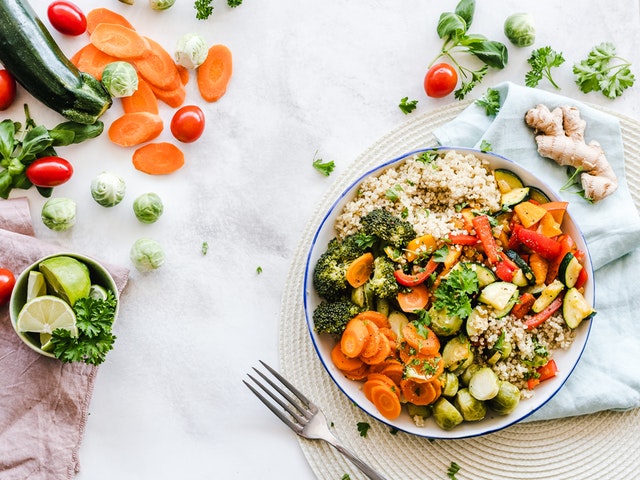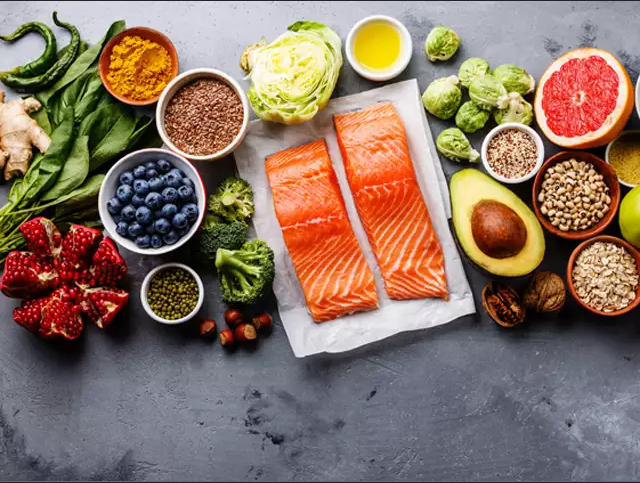Without necessarily embarking on a training as a nutritionist, it is important to take a minimum interest in the foods you eat. A balanced diet requires a good balance between the main nutrients contained in the foods consumed. Is it complicated? No! Because everything must be done naturally, with pleasure and above all with common sense.
Here are our tips that really work and allow you to have a balanced diet:

Eat when you are hungry
For a balanced diet, start by asking yourself if you are hungry. It sounds simple and almost silly, but too many people eat, ingest… without being ungry. It means forgetting a fundamental function of our body that can cause various problems (such as being overweight).
Cook!
To have a balanced diet, it is best to be familiar with the foods you eat. Cook them, or learn to do so, in short, get into the kitchen. It’s all the rage! Do it with pleasure, especially according to your skills and desires.
Enjoy and relax
For good nutrition and digestion, use the relaxation mode. Eating under stress can lead to various problems of poor assimilation, digestive pain… Having good nutrition and good digestion means eating sitting back and relaxed, avoiding constant consultation with your smartphone. Be careful if you are badly installed, standing, only a buttock on a corner of a stool, or the trunk broken in two….
Diversify your meals….
We keep telling you, for balanced nutrition, eat a variety of foods. So if you only have one dish at lunch, avoid pizza or steak fries every day. The best would be a large mixed salad with starchy foods, and yogurt, for example.
Avoid high-calorie, empty foods
That is to say, those foods that provide the body mainly with sugars and fats, but very few essential elements for its functioning, such as minerals, fibres, vitamins, or trace elements…
Fill up on vitamins
Everyone knows the famous rule: 5 fruits and vegetables a day. But in fact, if you eat more, it’s even better! The good news is that fruits and vegetables contain not only vitamins, but also a lot of minerals and fibres that are also essential for our body.
Vitamin C, B, D, A… Choose the fruits and vegetables that best meet your personal vitamin needs and especially: that you eat with pleasure!
Don’t neglect proteins
A balanced diet also contains proteins: they are an important source of energy for our body and are also satisfying, thus limiting the need for snacks! However, be sure to vary your protein sources: animal protein (fish, eggs, meat) and vegetable protein – generally more digestible and less fatty (legumes, cereals).
Get energy from carbohydrates
Carbohydrates are the fuel of our body. However, you should clearly prefer slow sugars such as cereals, wholegrain rice, wholegrain bread, or dried vegetables.

Choose high-fibre foods
Fibre (non-digestible sugars) is an important part of our diet, as it helps to better digest certain foods and protects against the occurrence of certain colon diseases: diverticulitis, cancer… They allow our intestines to function properly, play an essential role in regulating appetite and weight and even help to prevent certain diseases. So there are many good reasons to choose foods that contain large quantities of them, such as whole grains, legumes, some fruits and vegetables…
Cover your needs in trace elements
A balanced diet also means applying this other advice: absorbing trace elements that are necessary for our body in very small quantities: iron, copper, zinc, iodine, selenium… Some trace elements that often have antioxidant properties, cannot be synthesized by our body, and must therefore be taken from the diet to avoid deficiencies.
Choose foods rich in Omega 3
Omega 3 is essential fatty acids (lipids) for our health. To provide your body with everything it needs for proper functioning, choose foods rich in omega 3 such as rapeseed, flax or nut oil, fatty fish such as salmon, tuna and sardines, nuts and hazelnuts….
Hydrate yourself – by drinking the drinks that are good for you
Hydrate and limit your alcohol consumption!
It is recommended to drink at least 1.5 litres per day, preferably water or infusions or herbal teas without adding sugar. So beware of nectars and fruit juices, and especially sodas, which can be very rich in sugar.
And the alcohol? Even if we always read that a glass of wine a day is good for our health, thanks in particular to its antioxidant properties: it is strongly recommended to limit the consumption of alcoholic beverages, as they provide our body mainly with calories, and the risk of cancer increases rapidly with the amount consumed.
Take the time
For good nutrition, the first advice is to take a minimum of time to eat at each meal. Food will be well assimilated if it is ingested gradually. If this meal is made in less than half an hour, you’re wrong.
Don’t forget to chew
At every meal, remember to chew the food you eat well. Good chewing facilitates digestion, and the enzymes present in saliva begin to act in particular on certain sugars.
Don’t neglect breakfast
Breakfast is too often overlooked. For good nutrition, remember to eat enough for breakfast and diversified: a little protein (dairy product, salmon, egg,…), and moderate the sugar intake often too high (industrial cereals).
The ideal breakfast
Limit heavy dinners
On the other hand, try to eat light and “early” in the evening: your body will have difficulty digesting a heavy meal eaten late in the evening. And of course, he will also have no time to burn the calories ingested shortly before your rest phase. In short: prefer light meals (fruit, vegetables, etc.) in the evening and allow your body time to assimilate the food before going to bed.
Beware of snacking
Important advice: snacking is the great enemy of a balanced diet. Often caused by stressful or frustrating situations, the desire to snack pushes us towards unsavoury foods – most often sweet.
Try to stick to the 3 recommended main meals that you ideally take at fixed times. Possibly, you can include a small snack in the afternoon (fruit, yoghurt…) provided that the portions of the other 3 meals are adapted according to this additional intake.
10 tips to stop snacking
Beware of light products
Products that are low in sugar or fat seem to combine the nutritional qualities of what is called “healthy food”. But be careful: if these products are low in calories and should be a priori privileged, this does not mean that they should be consumed without moderation! Some low sugar products are actually quite high in fat (and the opposite is also true). It has not been shown that these light products always promote weight loss. On the other hand, they do not provide our body with all the nutrients it needs.
The essentials on light products





